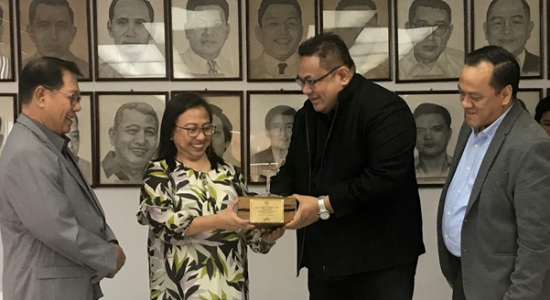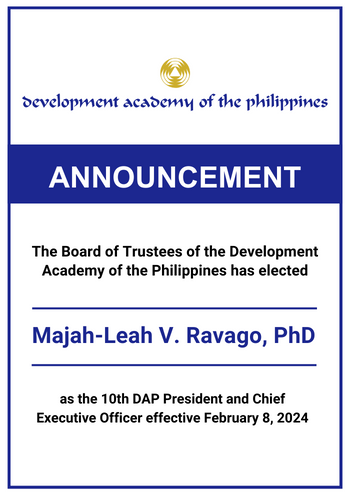
PNR General Manager Junn Magno (second from right), along with the PNR board members, presents a plaque of appreciation for the Development Academy of the Philippines for the technical assistance it has provided to the PNR to DAP Director Evangeline Macariola (second from left). The plaque, according to Magno, is a cutting from a century-old steel rail of the PNR.
The Philippine National Railways (PNR) received its ISO 9001:2015 Quality Management System (QMS) certificate of registration from the Certification International Philippines, Inc. last October 1 for three processes: (1) repair, rehabilitation, restoration, and maintenance of railway system; (2) train control and rolling stock maintenance; and (3) station operation and related services.
“The number one resource of the PNR is its people. [However,] they can only be cohesive because of consistent processes,” said PNR General Manager Junn Magno during the awarding ceremony. The PNR’s certification to ISO 9001:2015 has been one of Magno’s priorities upon his appointment in May 2017.
He also shared the exhaustive and challenging journey the PNR had to go through to achieve this commendable feat. He then expressed his gratitude to the staff and partners who have stood with them as they face a new era for their agency. He thanked the DAP for assisting the PNR in 2017 for the establishment of its QMS.
The PNR, according to Magno, its bid to deliver more efficient railway services to the riding public, took on the challenge of getting ISO-certified. “As an institution, the PNR has preserved a culture of servitude since its formation in 1892. However, from a train company that serves almost 300,000 people daily with a widely-utilized cargo service back in its early days, the PNR’s operation to date has slimmed down to serving around 20,000 people every day,” he added.
DAP Director Evangeline Macariola, whose team assisted the PNR in its QMS journey shared her aspiration for a more efficient mass transit in the country. “I would love to see the day when my grandchildren will enjoy traveling to many parts of the Philippines using the rail like other countries,” Macariola said. This milestone in PNR, she added, might hopefully serve as an inspiration to other government agencies to bring quality government services closer to its people.
Magno divulged that the PNR rail projects comprise a significant segment of the Build, Build, Build program of the administration. He further said 170 billion of the program’s total one trillion budget has been allocated to expanding the PNR’s services to cater to a larger public. “The PNR mulls extending its railway system to other provinces like Nueva Ecija and Cagayan and even outside of Luzon,” he added.
PNR QMS Leader Atty. Celeste D. Lauta said that the road to certification is not without challenges. “[The task of establishing PNR’s QMS] was totally a bark at the moon, or to attempt the impossible…I had to take on the challenge––a call to higher service is stronger than our personal inconvenience,” she added. – Earl Paulo Diaz




